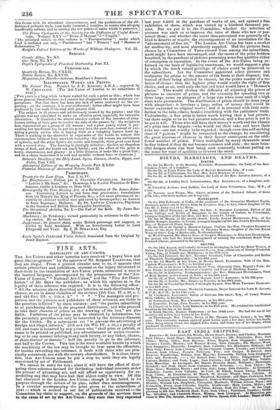FINE ARTS.
ILLEGALITY OF ART-UNIONS.
THE Art-Unions and other lotteries have received "a heavy blow and great discouragement" by the opinion of Mr. Sergeant TALFOURD, that they are illegal. From a printed circular sent to us, it appears that certain printsellers and publishers, alarmed at the injury threatened to their trade by the inundation of Art-Union prints, submitted a case to the learned Sergeant, accompanied by the prospectuses of the "Art- Union of London," "National Art-Union," and the "Fine Art Distri- bution" of Mr. Boys the publisher ; on which his opinion as to the legality of these schemes was required. It is to the following effect : "All the schemes abol e described are lotteries, or such distributions by chance, as are in direct violation of the statutes 12th Geo. II. c. 28, s. I, and 42d Geo. III. c. 119, s. 2." * * * "The managers and pro- jectors, and the printers and publishers of these schemes, are liable to the penalties inflicted" by those statutes ; and "the parties subscribing to or purchasing shares in the proposed distribution, and who proceed to take their chances of prizes at the drawing of the lots," are also liable. Forfeiture of the prizes may be obtained by information, but the pecuniary penalties can only be recovered by the Attorney-General for the Crown. By a subsequent act "to prevent the advertising of foreign and illegal lotteries," (6th and 7th Wil. IV. c. 66,) a penalty of 50/. and costs is incurred by any rerson who "shall print or publish, or cause to be printed or published, any advertisement or notice concern- ing or in any manner relating to any such lottery, or any ticket, chance, or share thereof or therein ": half the penalty to go to the informer, and half to the Crown. This last is the most available handle by which the machinery of the law may be brought to bear upon the offenders; for besides rewarding the informer, it deals with those who are prin- cipally concerned, not with the unwary shareholders. It is clear, there- fore, that Art-Unions must be put a stop to, until they are legally sanctioned by act of Parliament. We cannot be sorry for this ; since it will have the effect of dissi- pating those schemes devised for furthering individual interests under the pretext of advancing art, and will afford an opportunity for re- modelling any that may have had that object really in view. Of this last character is the London Art Union; though it has failed in its purpose through the defects of its plan, rather than mismanagement. In a circular accompanying the print given to the subscribers of 1841— which is noticed in our list of publications received— the Committee lay claim to support, on the grounds of the services done to the cause of art by the Art-Union: they state that they expended
last year 9,300/. in the purchase of works of art, and opened a free exhibition of them, which was visited by a hundred thousand per- sons. But we put it to the Committee, whether the selection of pictures was such as to improve the taste of those who saw or pos- sessed them ; and whether the talent thus patronized was generally of a kind to deserve or require the encouragement of an association for the "advancement of fine art." The London Art-Union has been a market for mediocrity, and most abundantly supplied. Had the pictures been chosen by a Committee of Taste elected from among the subscribers, merit might have been encouraged, and the tastes of the prize-holders benefited, by the purchase of pictures possessing some fine qualities either of conception or execution. In the event of the Art-Union being re- formed on the basis of legislative enactment, we would suggest a plan by which the much valued privilege of choice could be preserved to the subscribers. Let the Committee appointed select pictures and sculptures for prizes to the amount of the funds at their disposal ; but, instead of their being allotted by chance, let the prizes consist of a ro- tation of choice : thus the highest prize would confer the right of first choice, and so on, until only the last and least would have a " Hobson's choice." This would obviate the difficulty of adjusting the prices of pictures to amounts of prizes, and the necessity for spending two or three large sums on pictures of a large size when none such of a high class were procurable. The distribution of prints should be done away with altogether : it involves a large outlay of money that would be better expended on original works ; and it is attended with little satis- faction to the subszribers, besides interfering with the publishers' trade. Undoubtedly, a fine print is better worth having than a bad picture; hut there ought to be no bad pictures selected, and a fine print is not to be got at will. Those who will have their money's worth and the chance of a prize into the bargain—who would eat their cake and have their cake too—are not worthy to be regarded : though even this self-seeking class of "patrons" might be reconciled to the change, by considering tit.: great increase of chances in their favour consequent on the addi- tional number of prizes. Prints multiplied by many thousands must be fine indeed if they do not become common and stale : the most beau- tiful designs alone can bear being seen constantly without palling on the sense for want of qualities to interest the mind.


























 Previous page
Previous page